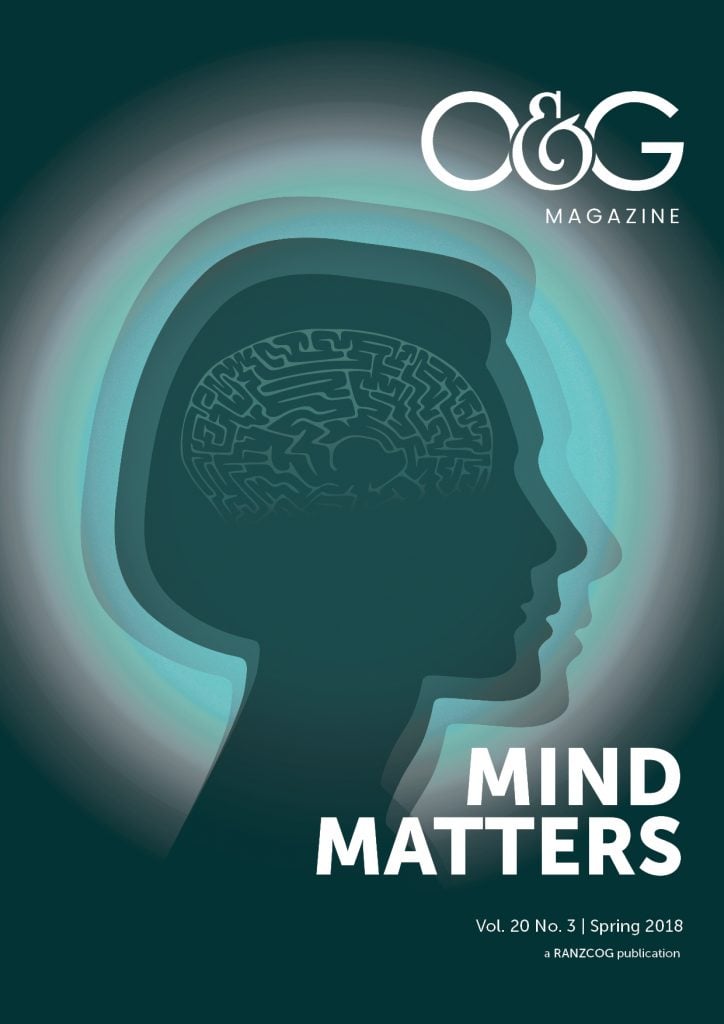The menopause transition can be a challenging time for women, bringing about changes in physical wellbeing, including vasomotor symptoms, sleep disturbance and vaginal dryness. Women may experience significant psychosocial change, including loss of identity associated with family, employment and reproductive changes. This article provides an overview of the mental health implications of the menopause transition and outlines important points for clinical practice in providing comprehensive care in the menopause setting.
Symptoms
Mood disturbance associated with the menopause transition may present with a variety of symptoms. Studies in this setting often use screening tools such as the Center for Epidemiologic Studies Depression Scale Revised (CESD-R) to classify symptoms, which may include low mood, sleep disturbance, loss of appetite, low libido, feelings of worthlessness and loss of interest in usual activities.
Depressive symptoms may be of significant severity to amount to a depressive disorder. However, some depressive symptoms, including sleep disturbance and low libido, are common experiences of menopause independent of mood disturbance. This distinction is clinically significant for the provision of patient-focused care, guiding management decisions and monitoring response to treatment. Furthermore, it highlights the broad nature of menopausal symptoms and the potential clinical value in creating menopause-specific tools for mental health.
Potential causes
There is extensive evidence of the connection between the menopause transition and depressive symptoms. Several longitudinal studies have shown that women in the menopause transition are up to twice as likely to experience a depressive disorder, compared to the premenopausal period, independent of a history of depression, with an overall prevalence that may be as high 40 per cent.1, 2, 3, 4
Data regarding the postmenopausal period is conflicting. Bromberger et al and Mulhall et al have demonstrated increased risk of having a depressive disorder during the postmenopausal period.5, 6 However, observational data from Freeman et al showed that this was only the case for women with a history of depression, who were eight times more likely to have postmenopausal depression. In contrast, women with no prior history of depression who experienced a perimenopausal depressive disorder had no higher risk of postmenopausal depression than women who had not had any depressive symptoms associated with the menopause transition.7
There is no high-level evidence demonstrating a clear relationship between basal hormone levels and symptom onset. However, there are several factors clearly suggesting a hormonal basis to the disorder. Depressive symptoms in the menopause transition remain prevalent in the absence of a history of mental illness. There is extensive data from both animal and human studies demonstrating the involvement of ovarian steroids in neuroregulatory pathways, particularly those involving serotonin and noradrenaline, known to be implicated in depression.8 There are also randomised controlled data demonstrating significant improvement in depressive symptoms with the use of hormonal replacement therapy9, 10 and, moreover, recurrence of depressive symptoms in women with perimenopausal depression following withdrawal of hormone treatment.11
There are several other aspects to the menopause transition involved in the development of depressive symptoms. Worsley et al undertook a systematic review that demonstrated the relationship between depressive and vasomotor symptoms during the menopause transition. The presence of vasomotor symptoms increased the risk of developing depressive symptoms and depressive symptoms increased the prevalence of vasomotor symptoms.12
Poor sleep quality during the menopause transition has also been implicated. Vasomotor symptoms may predispose to depression by reducing sleep quality. However, evidence has been conflicting and reduced sleep quality occurs during this time independent of vasomotor symptoms.13, 14, 15, 16
Management
Depressive symptoms during the menopause transition are multifactorial and treatment should address the individual history and clinical experience. Antidepressants remain first-line pharmacological treatment in the management of perimenopausal mood disturbance. Oestrogen hormonal therapy has been shown to be effective in improving depressive symptoms in perimenopausal women.17, 18, 19 However, a clinical consideration is the need for concomitant progesterone therapy for women with an intact uterus, which has been shown to potentially worsen depressive symptoms.20While hormonal therapy may offer additional benefit to mood disturbance when used for the treatment of vasomotor symptoms, current guidelines advise against the use of hormonal therapy for the primary treatment of perimenopausal depressive symptoms.21
Consideration should also be given to the use of psychological management to address the biopsychosocial issues arising during the menopause transition. Cognitive-behavioural therapy has been shown to be effective in improving both physical and psychological symptoms of menopause and is an important alternative or adjunct to pharmacological treatment.22
Conclusion
The menopause transition involves a challenging period of physical and psychological change for many women. Clinicians should be mindful of predisposing factors for developing perimenopausal mood disturbance, such as a history of depressive disorders, including postnatal depression and premenstrual mood disturbance. Comprehensive, patient-focused care requires an understanding of the symptoms of menopause and depression and a targeted approach to managing the individual experience of both.
References
- Freeman EW, Sammel MD, Lin H, et al. Associations of hormones and menopausal status with depressed mood in women with no history of depression. Arch Gen Psychiatry 2006;63:375-382.
- Freeman EW, Sammel MD, Boorman DW. Longitudinal pattern of depressive symptoms around natural menopause. JAMA Psychiatry 2014;71(1):36-43.
- Cohen LS, Soares CN, Vitonis AF, et al. Risk for new onset of depression during the menopausal transition. Arch Gen Psychiatry 2006;63: 85-390.
- Timur S, et al. The prevalence of depression symptoms and influencing factors among perimenopausal and postmenopausal women. Menopause 2010;17(3):545-51.
- Bromberger JT, Kravitz HM, et al. Major depression during and after the menopausal transition: study of Women’s Health Across the Nation (SWAN). Psychol Med. 2011;41(9):1879-88.
- Mulhall S, Andel R, Anstey KJ. Variation in symptoms of depression and anxiety in midlife women by menopausal status. Maturitas 2018;108:7-12.
- Freeman EW, Sammel MD, Boorman DW. Longitudinal pattern of depressive symptoms around natural menopause. JAMA Psychiatry 2014;71(1):36-43.
- Schmidt PJ, et al. Sex hormones and mood in the perimenopause. Annals of the New York Academy of Sciences 2009;1179:70-85.
- Schmidt PJ, Nieman L, Danaceau MA, et al. Estrogen replacement in perimenopause-related depression: a preliminary report. Am J Obstet Gynecol. 2000;183:414-420.
- Soares CD, Almeida OP, Joffe H, et al. Efficacy of estradiol for the treatment of depressive disorders in perimenopausal women: a double-blind, randomized, placebo-controlled trial. Arch Gen Psychiatry 2001;58:529-534.
- Schmidt PJ, Dor RB, et al. Effects of Estradiol Withdrawal on Mood in Women With Past Perimenopausal Depression
A Randomized Clinical Trial. JAMA Psychiatry 2015;72(7):714-726. - Worsley R, Bell R, Kulkarni J, et al. The Association Between Vasomotor Symptoms and Depression During Perimenopause: A systematic review. Maturitas 2014;77:111-117.
- Joffe H, Soares CN, Thurston RC et al. Depression is associated with worse objectively and subjectively measured sleep, but not more frequent awakenings, in women with vasomotor symptoms. Menopause 2009;16(4):671-9.
- Lampio L, Polo-Kantola P, Polo O, et al. Sleep in midlife women: effects of menopause, vasomotor symptoms and depressive symptoms. Menopause 2014;21(11):1217-1224.
- Vivian-Taylor J, Hickey M. Menopause and depression: Is there a link? Maturitas 2014;79:142-146.
- Lampio L, Saaresranta T, et al. Predictors of sleep disturbance in menopausal transition. Maturitas 2016;94:137-142.
- Schmidt PJ, Nieman L, Danaceau MA, et al. Estrogen replacement in perimenopause-related depression: a preliminary report. Am J Obstet Gynecol. 2000;183:414-420.
- Soares CD, Almeida OP, Joffe H, et al. Efficacy of estradiol for the treatment of depressive disorders in perimenopausal women: a double-blind, randomized, placebo-controlled trial. Arch Gen Psychiatry 2001;58:529-534.
- Gordon JL, Rubinow DR, Eisenlohr-Moul TA, et al. Efficacy of transdermal estradiol and micronized progesterone in the prevention of depressive symptoms in the menopause transition, a randomized clinical Trial. JAMA Psychiatry 2018;75(2):149-157.
- Andreen L, Nyberg S, Turkmen S, et al. Sex steroid induced negative mood may be explained by the paradoxical effect mediated by GABAA modulators. Psychoneuroendocrinology 2009;34(8): 1121-32.
- North American Menopause Society. The 2012 Hormone Therapy Position Statement of the North American Menopause Society. Menopause 2012;19(3):257-271.
- Vélez Toral M, Godoy-Izquierdo D, et al. Psychosocial interventions in perimenopausal and postmenopausal women: a systematic review of randomised and non-randomised trials and non-controlled studies. Maturitas 2014;77:93-110.






Leave a Reply